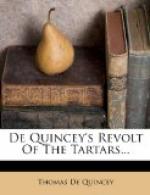41 20. those of Xerxes. See Crete’s History of Greece, Chap. XXXVIII.
41 29. untread. A dictionary word, but uncommon. Recall similar words used by De Quincey which add picturesqueness in part because of their novelty.
41 31. their old allegiance. 1616. See the close of this paragraph.
41 33. scapegoat. Leviticus, xvi, 7-10; 20-22.
42 32, 33. land of promise ... house, etc. Deuteronomy, viii, 14; ix, 28.
43 8. Orsk. Upon the river Or.
43 9. Oriembourg. A fort.
43 23. sinister. Etymology?
43 29. transpiring. Like aggravate and liable, a word often misused. What does it mean?
44 10. were dispersed. Note the variety of phrases in the following ten lines used to indicate separation.
46 16. Hetman. Chief. Compare Germ. Hauptmann, Eng. captain, Fr. chef.
47 1. evasion. See previous note on p. 33, l. 7.
48 2. carabines. Old-fashioned spelling. Short rifles adapted to the use of mounted troops.
49 13. without a parallel. As has been seen, De Quincey is fond of superlative statements. A writer may or may not be true in his claims; the habitual assumption, however, predisposes his reader to doubt his judgment.
49 16. Desultors. This word is not in common use, but desultory is. Look up the derivation and note the metaphor concealed in the latter word.
49 19. at the rate of 200 miles. Compare preceding note on p. 24, 1. 26.
50 27. “more fell,” etc. From the last speech in Shakespeare’s Othello, addressed to Iago:
O
Spartan dog,
More fell than anguish, hunger, or the
sea!
Look on the tragic loading of this bed;
This is thy work.
51 17. “fierce varieties.” Misquoted. See Paradise Lost, II, 599; VII, 272.
51 19. post equitem, etc.:
Behind the horseman sits black care.
—Horace’s Odes,
III, 1, 40.
51 20. undying worm. Isaiah, lxvi, 24.
51 29. “from morn till dewy eve.” Paradise Lost, I, 742.
52 33. On a fine morning. Study this paragraph carefully with reference to the rhetorical effect. The entire scene is the product of De Quincey’s imagination; do you consider it truthful?
53 24. yagers. German Jaeger; used of a huntsman or a forester, also in parts of Germany and Austria used to indicate light infantry or cavalry. Compare with Polish dragoons, p. 38, l. 10.
54 21. indorsed. Look up the etymology. Has De Quincey, in his note, quoted Milton accurately? See Paradise Regained, III, 329.
56 13. rather in a diagonal. This is another characteristic of De Quincey; he is sometimes tediously exact in his details; perhaps the minuteness is justifiable in this instance, as the statement increases the realistic effect of an imaginary scene.




